graphhighlight
Noriaki Sato
2023-03-27
usage_of_graphhighlight.Rmdgraphhighlight
This package highlights nodes, edges and node texts of ggraph plots when one wants to inspect the graph information after the plots are created.
Usage
Generate a random graph.
library(ggraph)
library(igraph)
library(graphhighlight)
set.seed(1)
g <- random.graph.game(10,0.1,directed=TRUE)
E(g)$weight <- sample(1:10, length(E(g)), replace=TRUE)
V(g)$size <- sample(1:10, length(V(g)), replace=TRUE)
V(g)$name <- letters[1:length(V(g))]highlight_node
This function highlights the nodes by specifying
node_name or filter specifying conditions for
including nodes in string. If highlight_color is specified,
the node color will be changed.
ggraph(g, layout="nicely")+
geom_node_point(aes(size=size))+
highlight_node(filter=size>7,
highlight_color="red")+
theme_graph()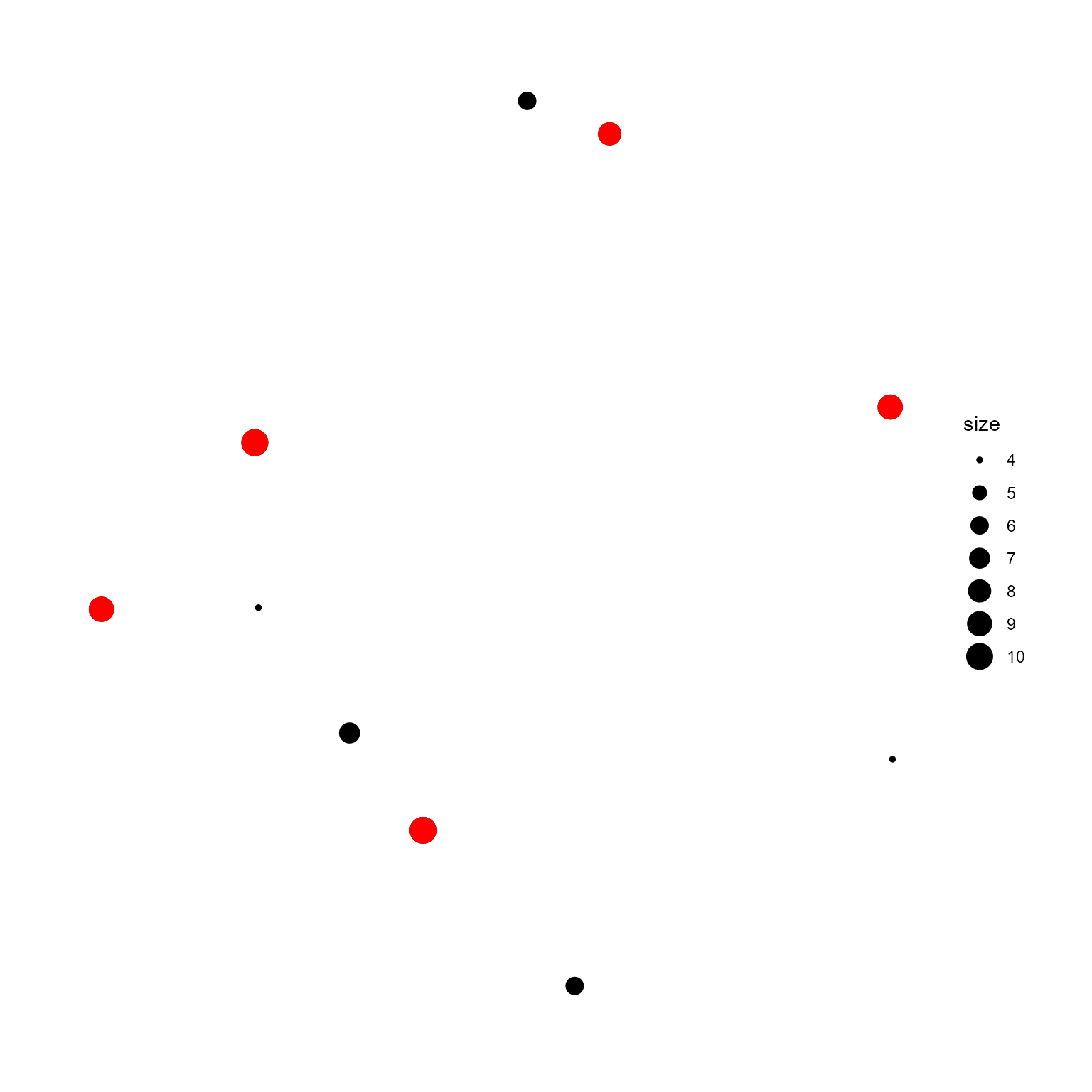
Or highlighting by some shapes by stacking the layers. If
specify_shape is specified, the nodes can be highlighted by
shape, and specify_shape_size determines the size,
shape_color the color of the shape.
ggraph(g, layout="nicely")+
geom_node_point(aes(size=size))+
highlight_node(filter=size>7,
shape_number = 21,
shape_size = 21,
shape_color="red")+
theme_graph()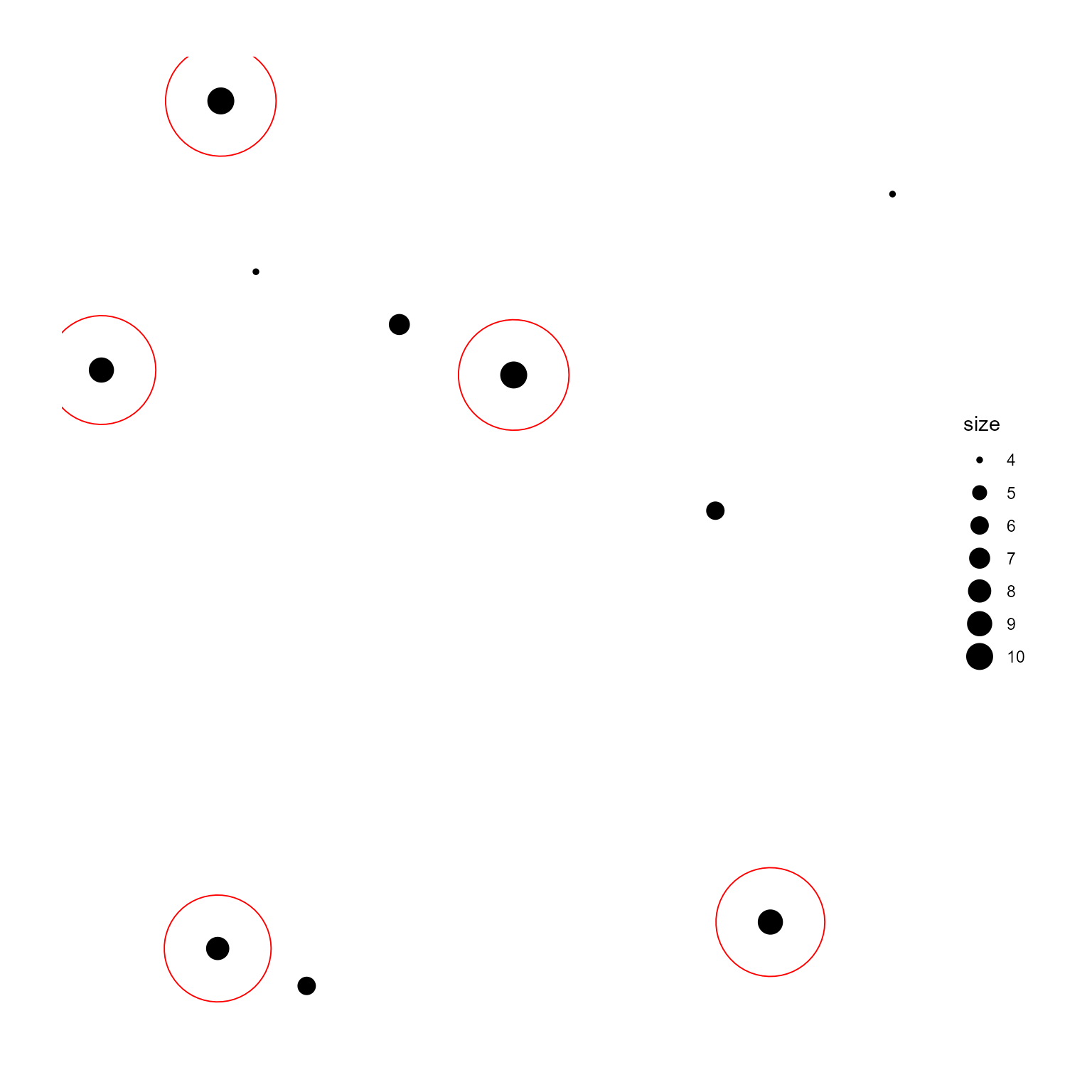
Or by making nodes glowing-look. The argument glow
should be set to TRUE. If no highlight_color
is specified, the raw colors of nodes are used.
ggraph(g, layout="nicely")+
geom_node_point(aes(size=size, color=size))+
scale_color_viridis()+
highlight_node(filter=size>7,glow=TRUE)+
theme_graph()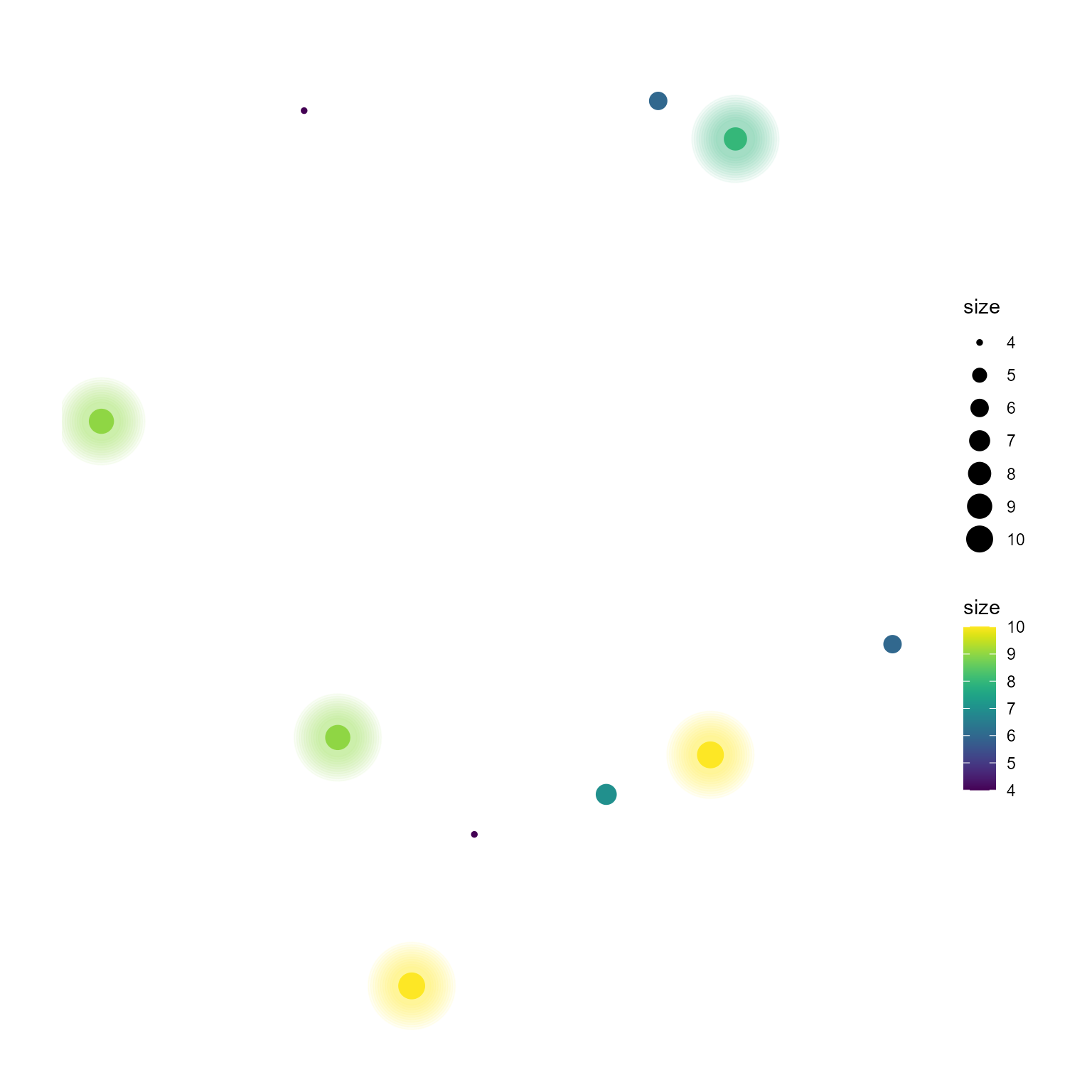 If
If highlight_color is specified, that color is used.
ggraph(g, layout="nicely")+
geom_node_point(aes(size=size, color=size))+
scale_color_viridis()+
highlight_node(filter=size>7,glow=TRUE,
highlight_color="tomato")+
theme_graph()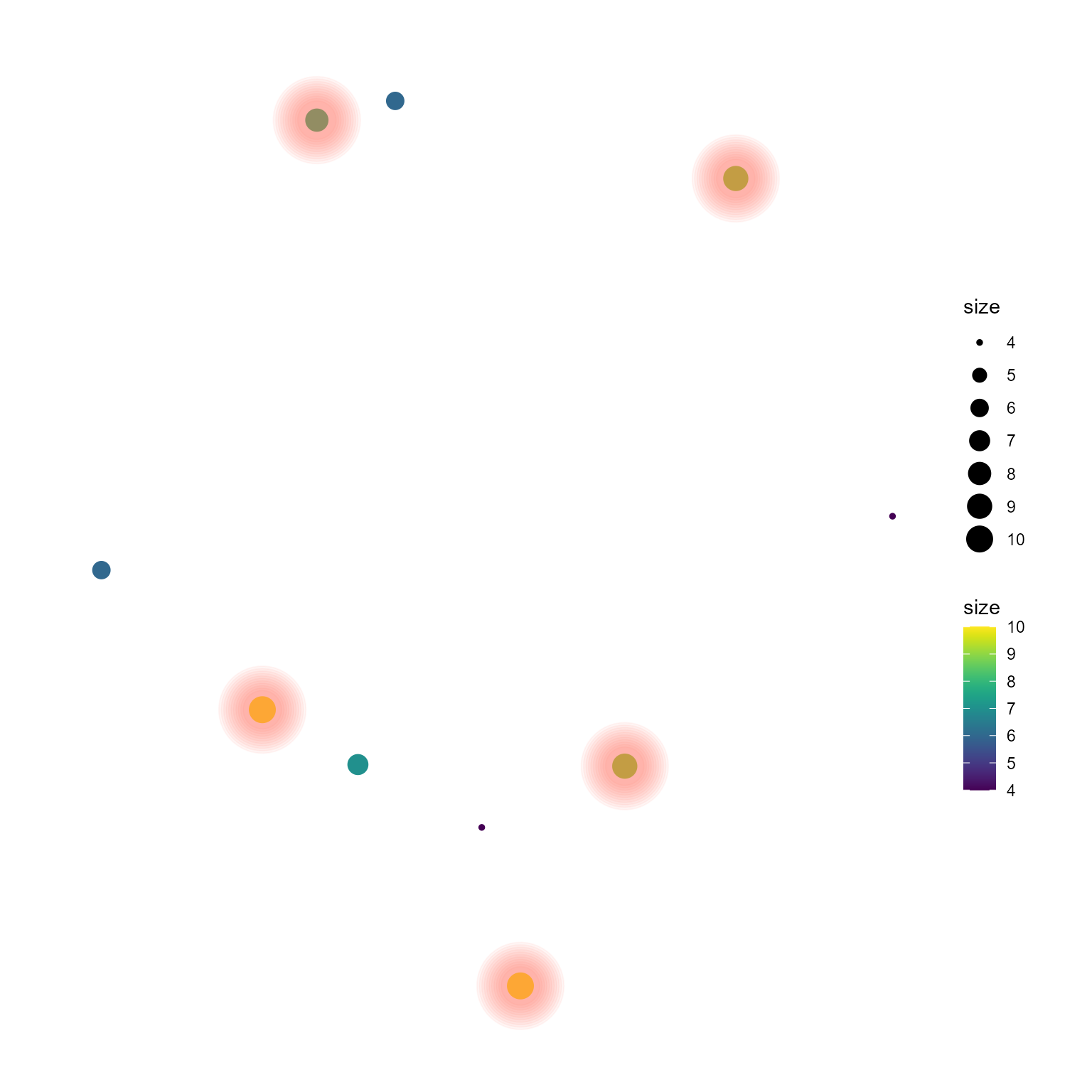
glow_size controls how big the glowing will be.
glow_base_size will use base node size for glowing.
Otherwise the same parameters are used for stacking the layers.
ggraph(g, layout="nicely")+
geom_node_point(aes(size=size, color=size))+
scale_color_viridis()+
highlight_node(filter=size<7,glow=TRUE,
glow_size=5,
glow_base_size = TRUE)+
theme_graph()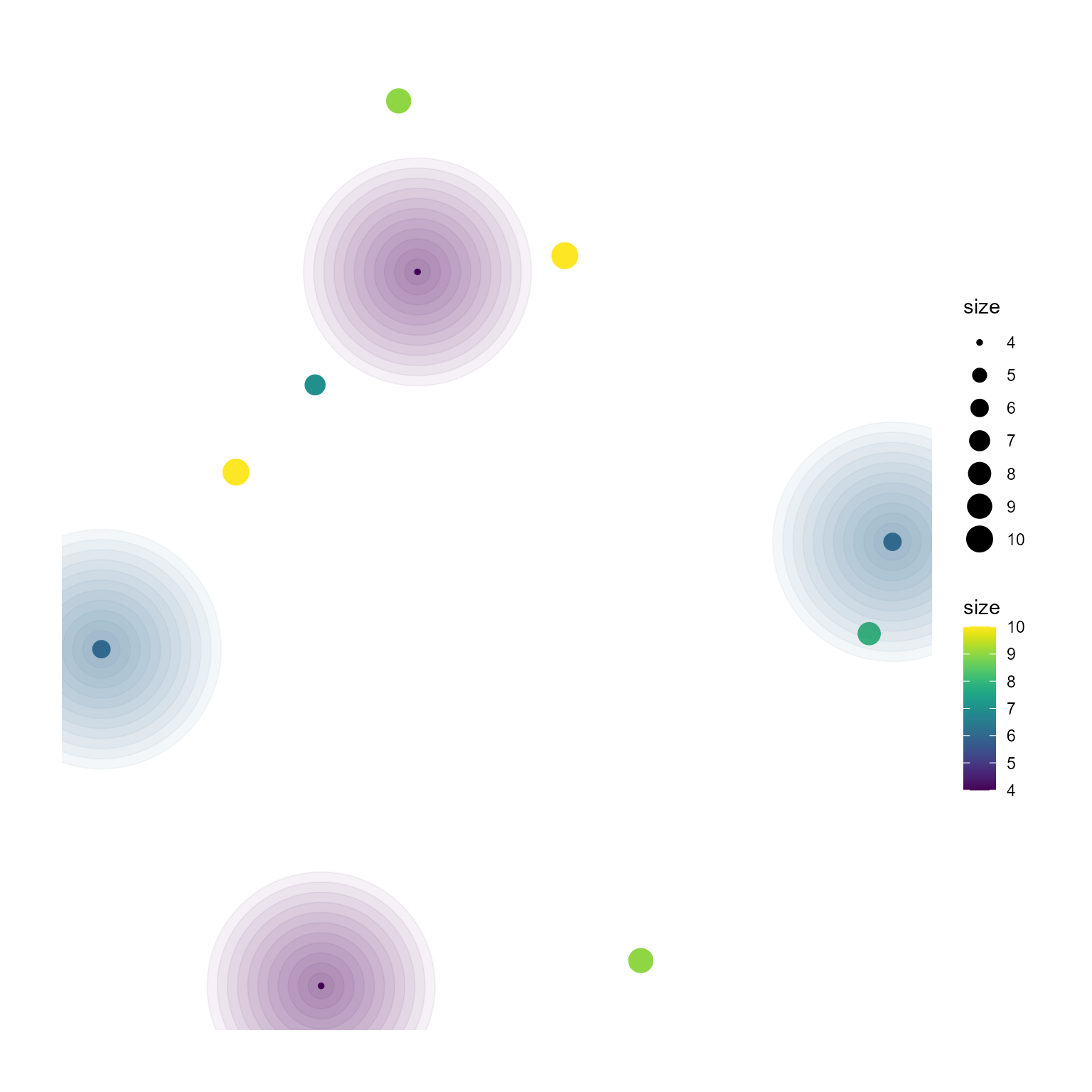
The same glowing function is implemented for highlighting edges in
highlight_edge, but not for
highlight_node_text as for the text,
shadowtext by Prof. Guangchuang Yu implmented in
geom_node_text and geom_text_repel can
highlight the text much better.
highlight_node and highlight_edge accept
various filter functions in ggfx, which can be specified by
use_ggfx and ggfx_params as parameters. This
is same as stacking the layer of geom_node_text with
filtering function.
library(ggfx)
ggraph(g, layout="nicely")+
geom_node_point(aes(size=size, color=size))+
scale_color_viridis()+
highlight_node(filter=size<7,
use_ggfx="with_outer_glow",
ggfx_params=list(colour="red",expand=5))+
theme_graph()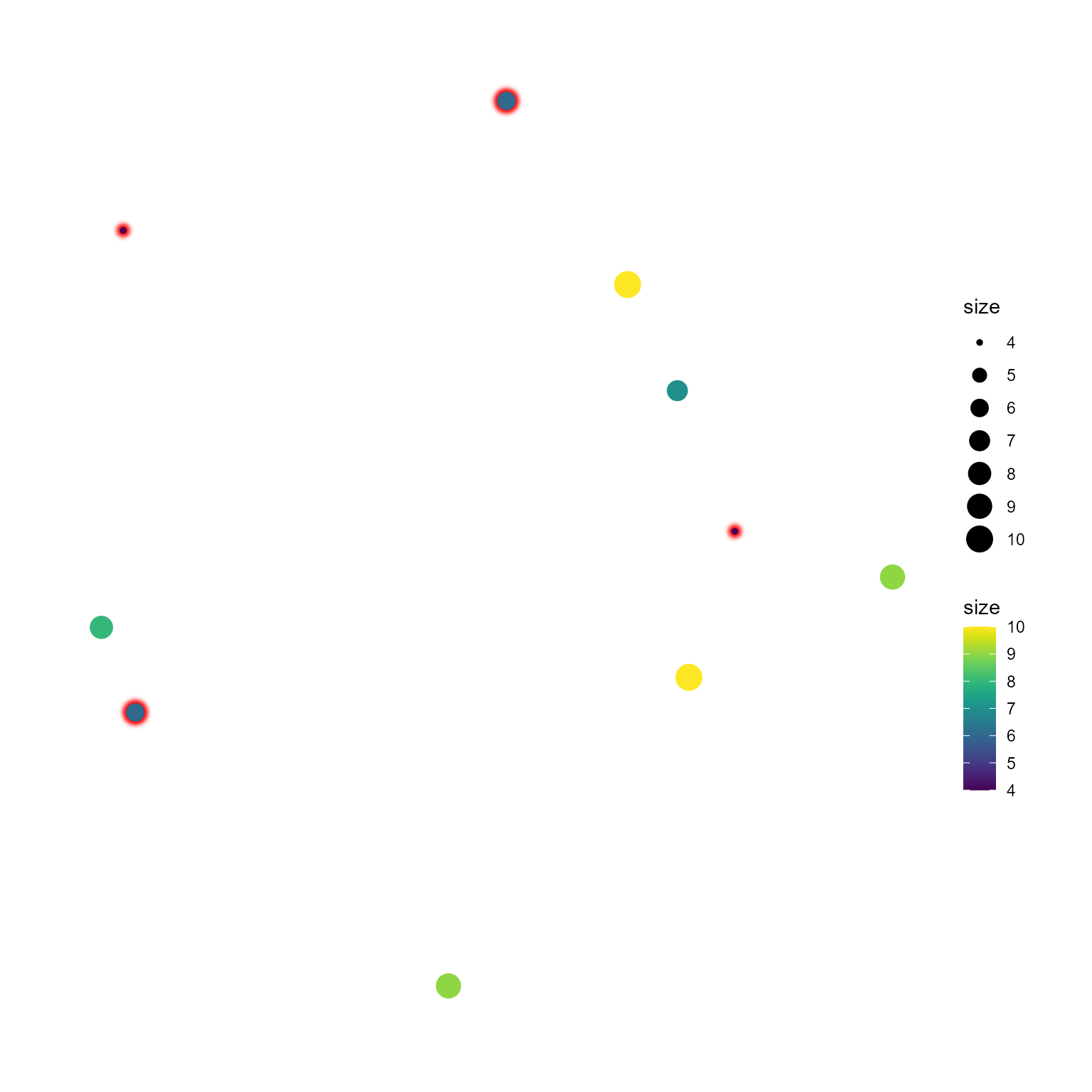
Further, using geom_textpath in
geomtextpath package, the text annotation can be added to
nodes.
library(geomtextpath)
ggraph(g, layout="kk")+
geom_edge_link()+
geom_node_point(aes(size=size, color=size))+
scale_color_viridis()+
highlight_node(filter=size>7,
shape_with_text = "this node is interesting",
shape_size = 21,
textpath_params=list(size=3,
text_only=TRUE,
offset=unit(5,"mm"),
bg.colour="grey"))+
coord_fixed()+
theme_graph()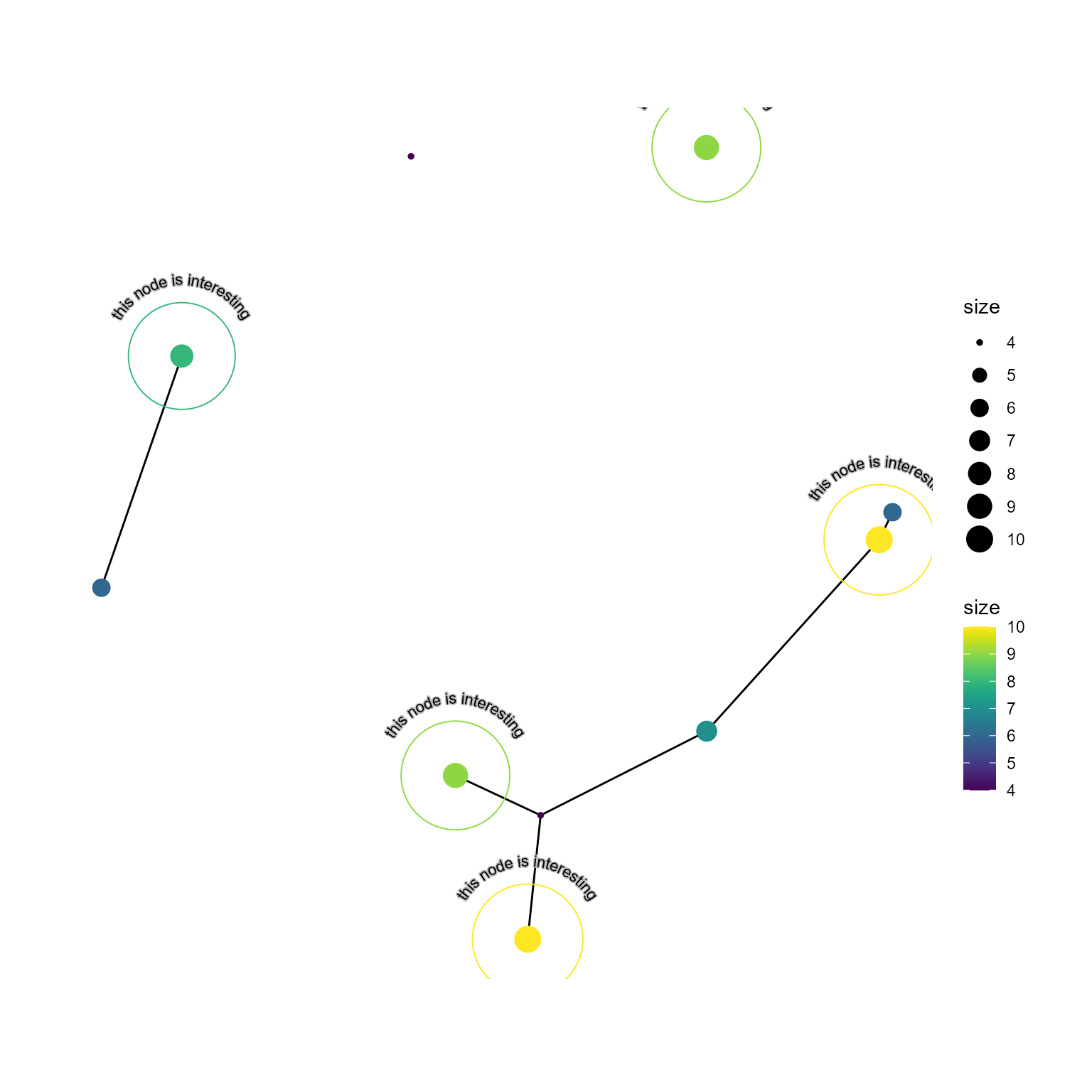
By default, texts specified in shape_with_text or
with_text (without the shape) is annotated to all the
nodes. If text_attribute is set, the node attributes of the
same name is taken and plotted like the example below.
text_attribute will override the former parameters. If
text_node_color is set to TRUE, node color
will be used as text color.
V(g)$text <- unlist(strsplit(stringi::stri_rand_lipsum(1), " "))[1:length(V(g))]
ggraph(g, layout="nicely")+
geom_edge_link()+
geom_node_point(aes(size=size, color=size))+
scale_color_viridis()+
highlight_node(filter=size>7,
with_text = "this node is interesting", # whatever not NULL
text_attribute="text",
text_node_color=TRUE,
textpath_params=list(size=3,
text_only=TRUE,
offset=unit(4,"mm"),
bg.colour="black"))+
coord_fixed()+
theme_graph()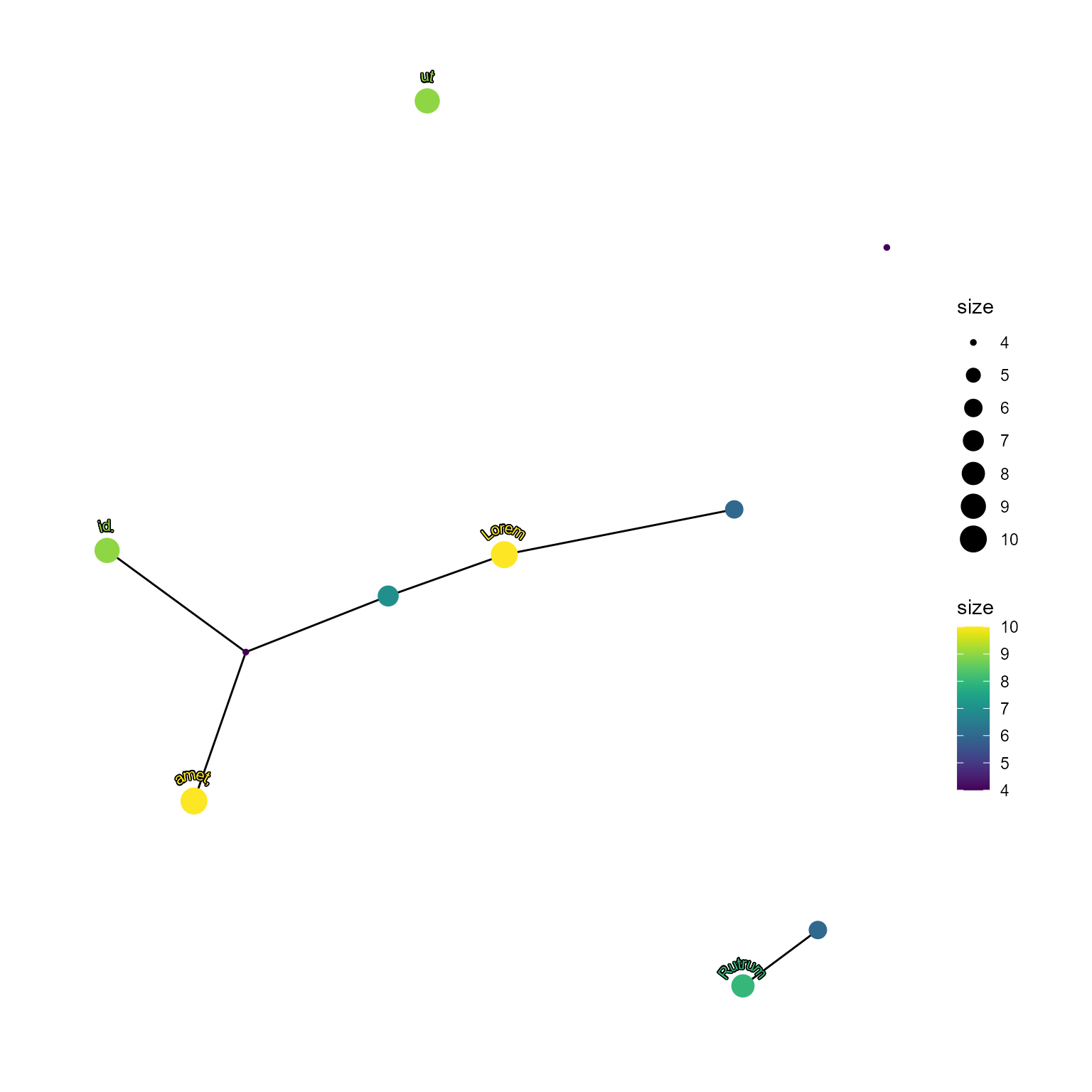
highlight_edge
Edges can be highlighted in the same way as
highlight_node.
ggraph(g, layout="nicely")+
geom_edge_diagonal(aes(width=weight,
color=weight))+
scale_edge_color_gradient(low="blue",high="red")+
highlight_edge(filter=weight>7,
highlight_color="pink")+
theme_graph()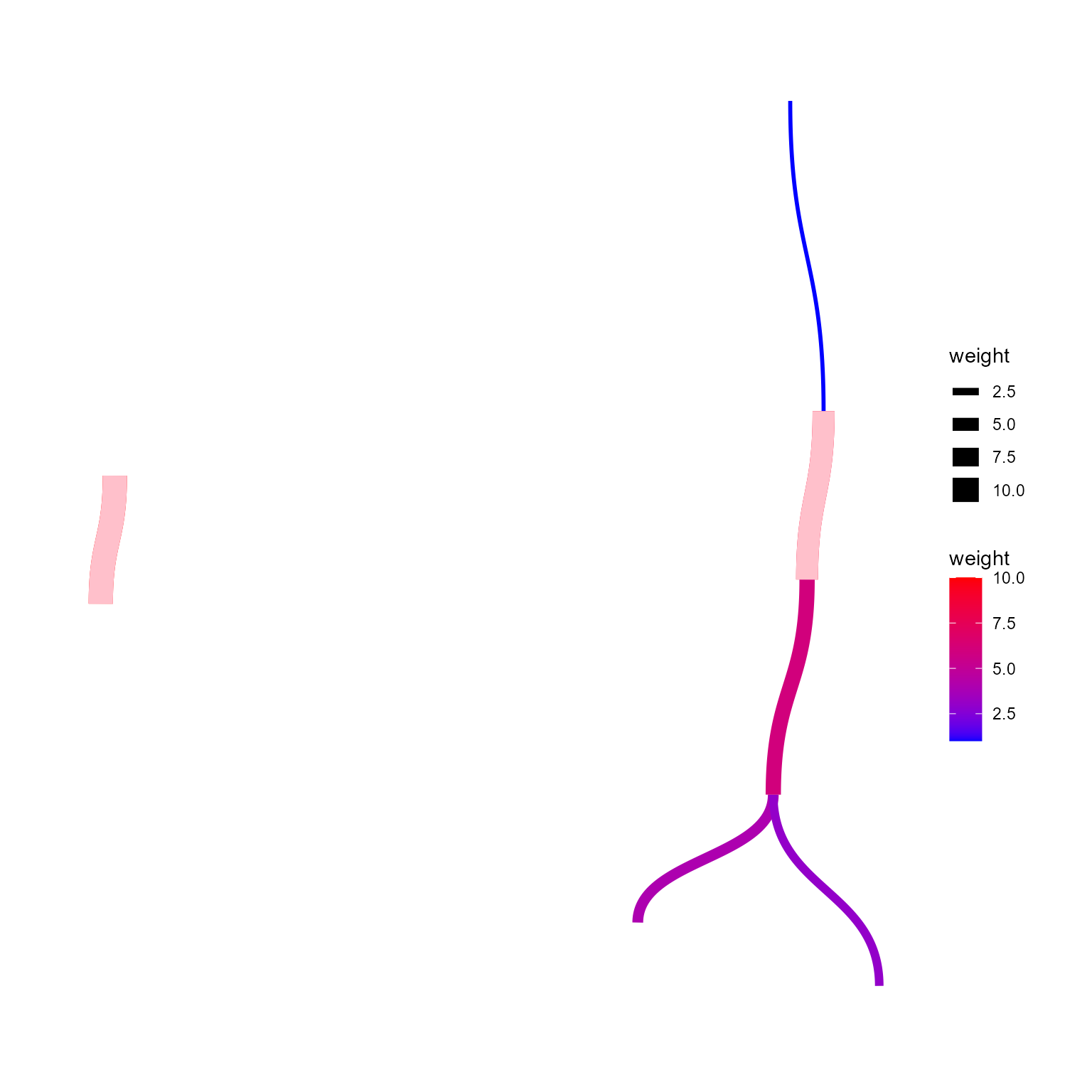
The same can be performed for the other geoms.
ggraph(g, layout="nicely")+
geom_edge_bend2(aes(width=weight,
color=weight))+
scale_edge_color_gradient(low="blue",high="red")+
highlight_edge(filter=weight>7,
highlight_color="pink")+
theme_graph()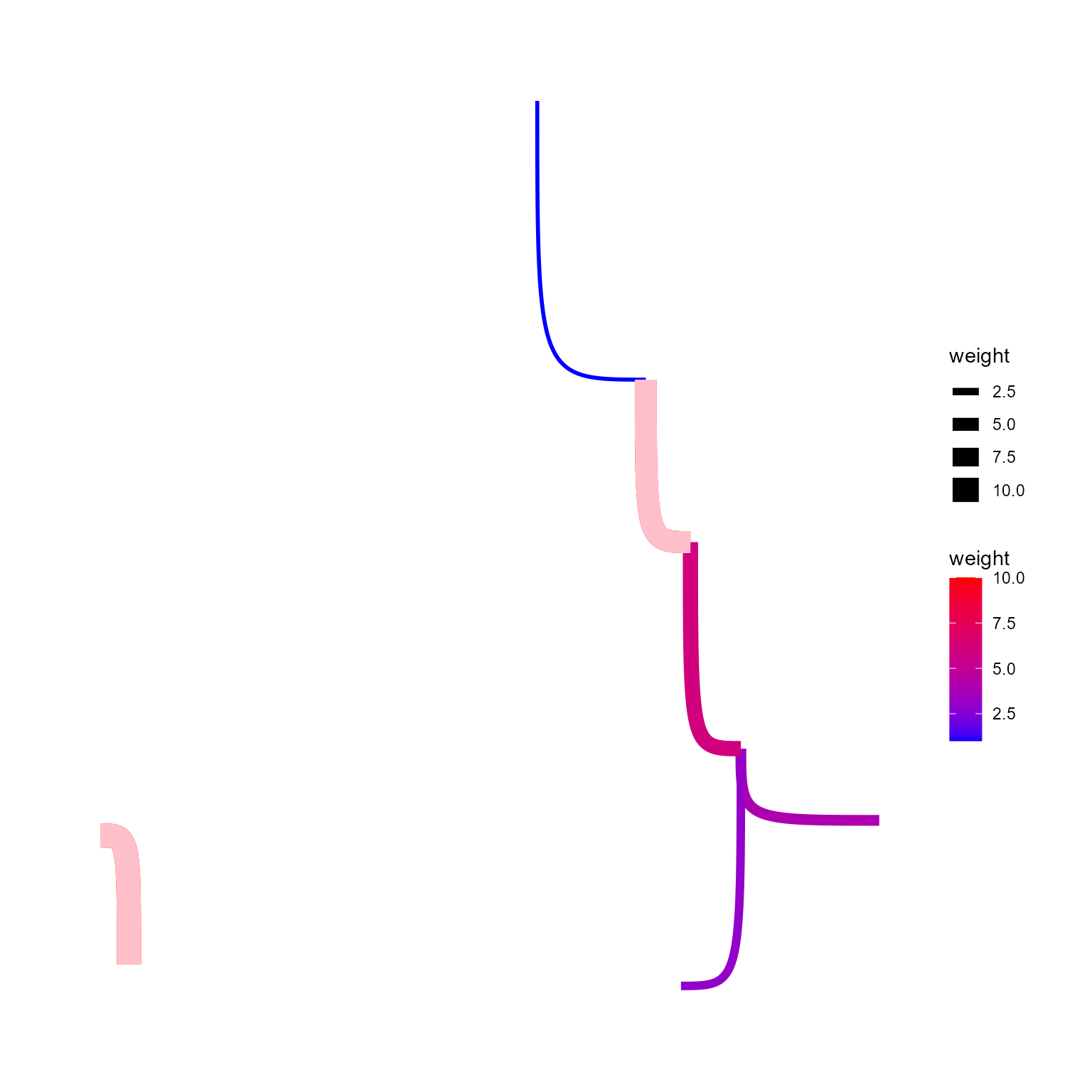
With the arrows.
ggraph(g, layout="nicely")+
geom_edge_link(aes(width=weight),
arrow = arrow(length = unit(4, 'mm')),
end_cap = circle(5, 'mm'),
start_cap = circle(5, "mm"))+
highlight_edge(filter=weight<5,
highlight_color="steelblue")+
theme_graph()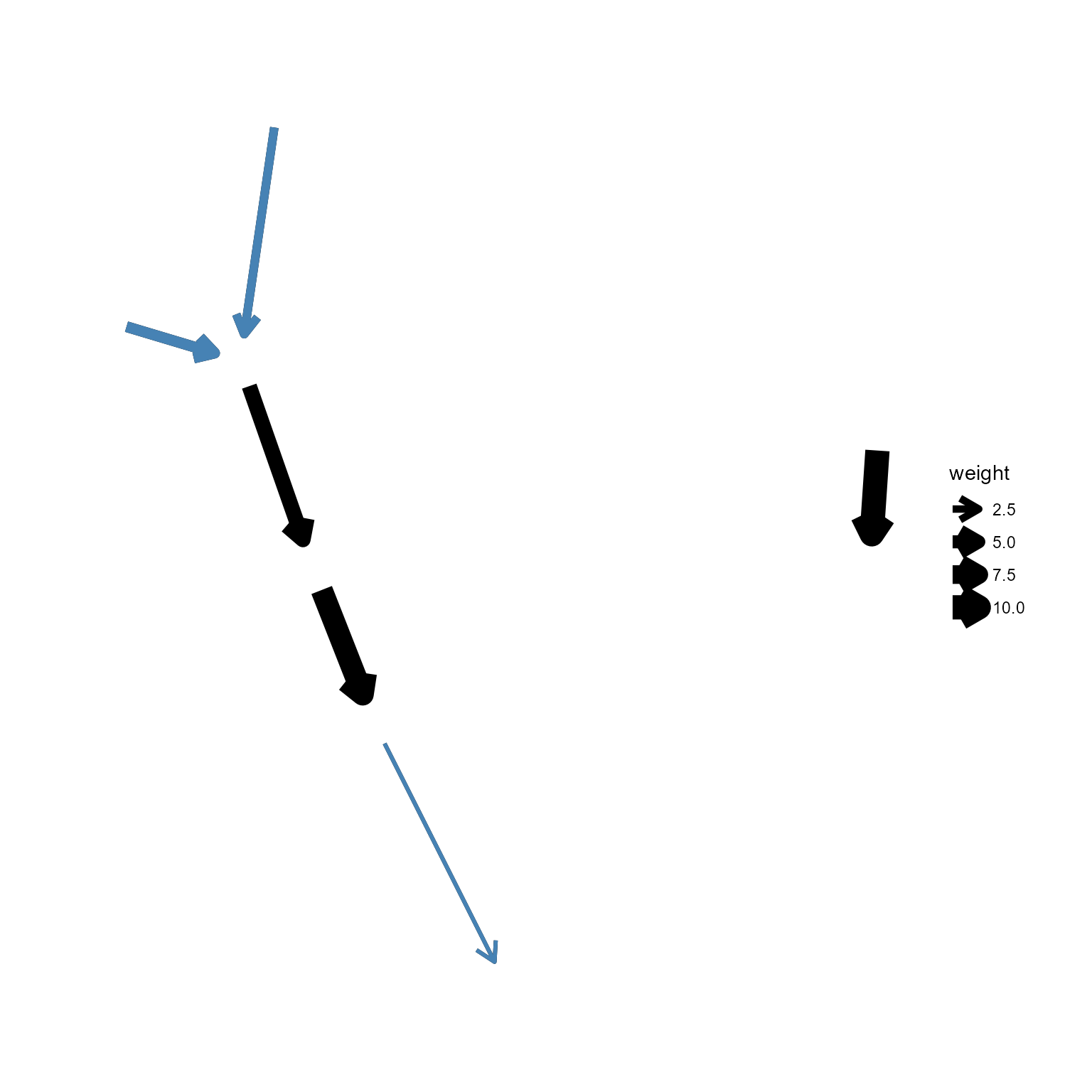
Glowing function can be applied by specifying glow to
TRUE. geom_edge_size controls how big the
glowing will be. Note that specifying big number will deteriorate the
looking.
ggraph(g, layout="nicely")+
geom_edge_link(aes(width=weight),
arrow = arrow(length = unit(4, 'mm')),
end_cap = circle(5, 'mm'),
start_cap = circle(5, "mm"))+
highlight_edge(filter=weight<5,
glow=TRUE,
highlight_color="steelblue",
glow_edge_size =0.5,
glow_fixed_color = TRUE,
glow_base_size =TRUE )+
theme_graph()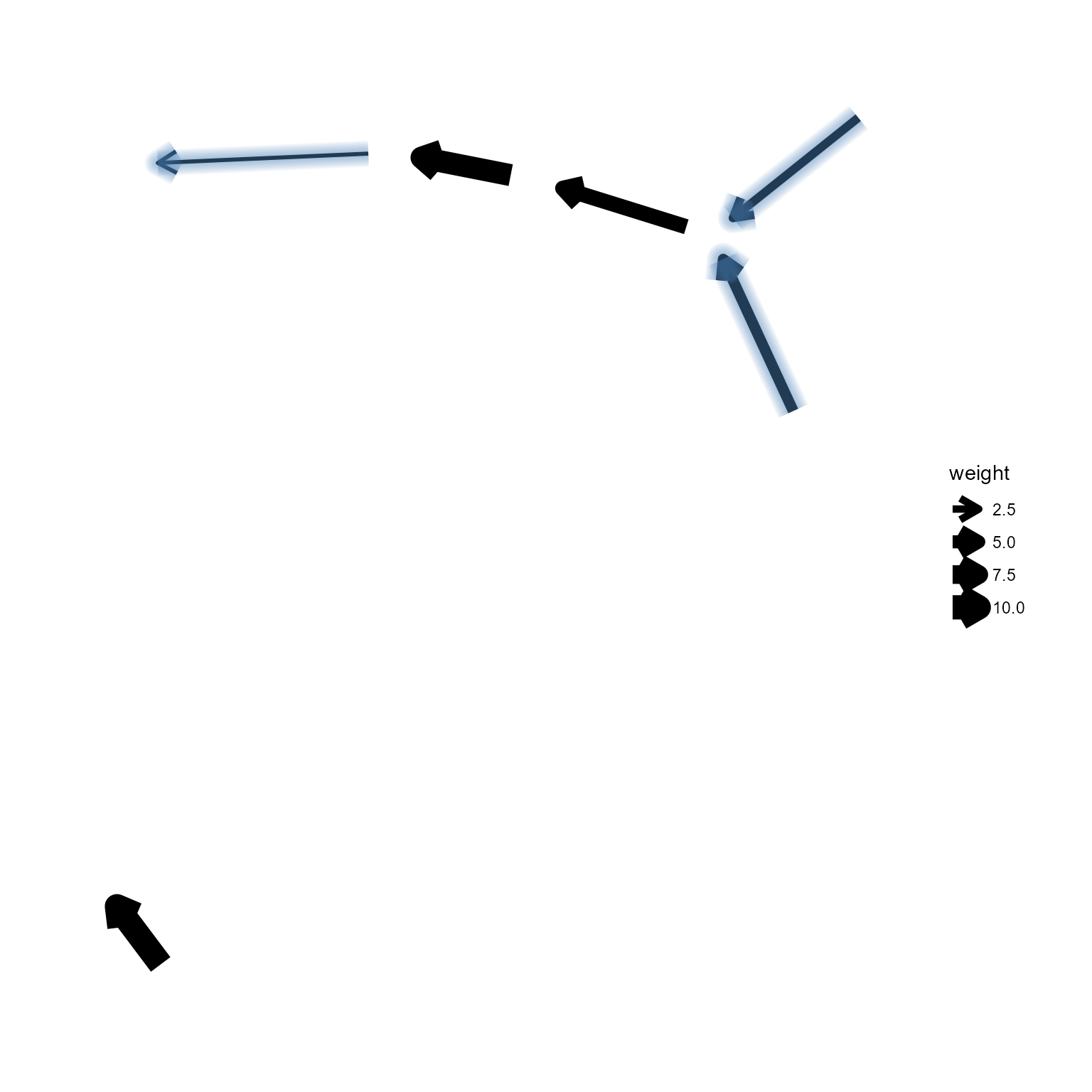
Coloring of edge labels is controlled by
change_label_color.
ggraph(g, layout="nicely")+
geom_edge_link(aes(width=weight,
label=weight),
angle_calc="along",
label_dodge = unit(5, 'mm'),
position="identity",
arrow = arrow(length = unit(4, 'mm')),
end_cap = circle(5, 'mm'),
start_cap = circle(5, "mm"))+
highlight_edge(filter=weight>5,
change_label_color=TRUE,
highlight_color="red")+
theme_graph()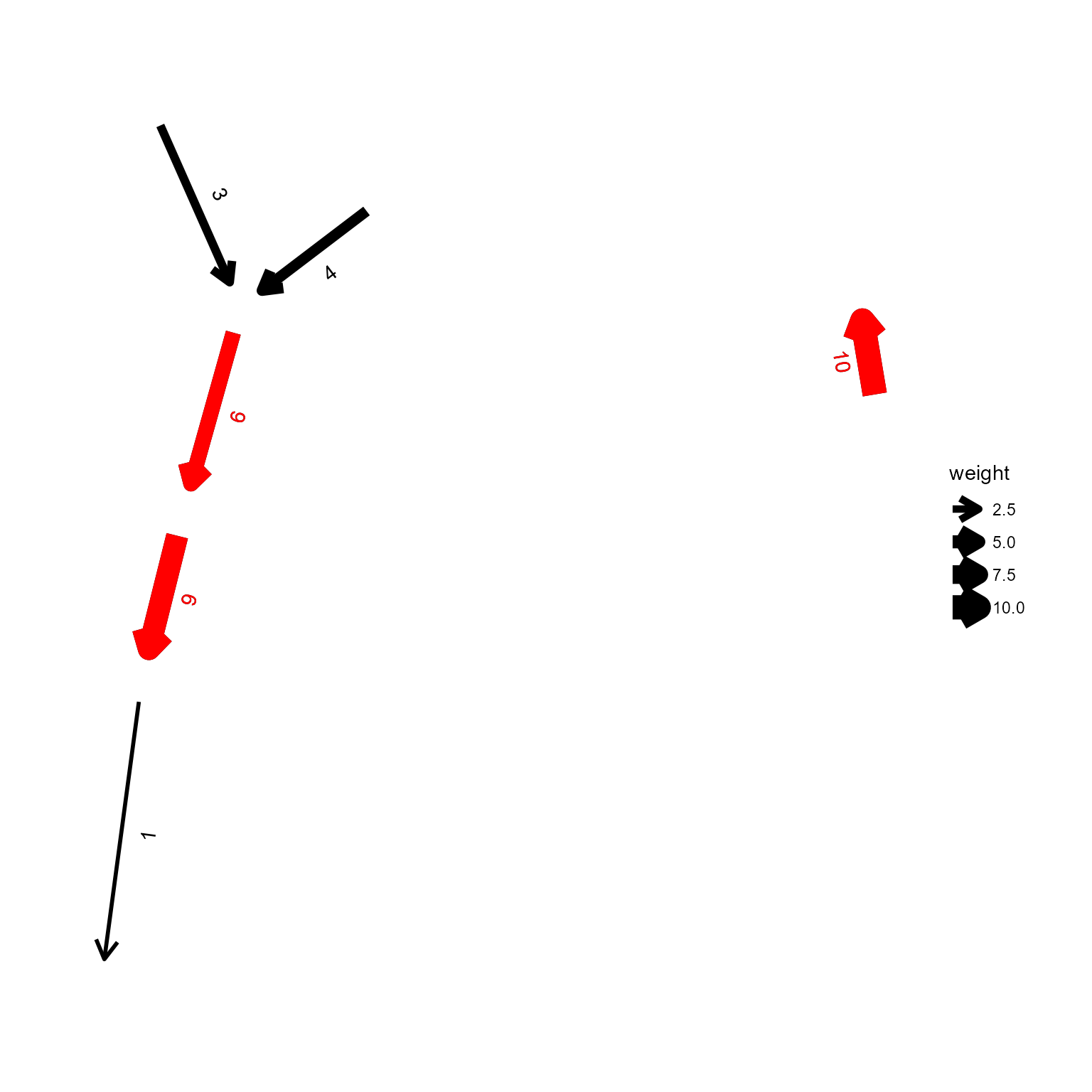
highlight_node_text
ggraph(g, layout="nicely")+
geom_node_text(aes(label=name, color=size, size=size), repel=TRUE, bg.colour="grey")+
highlight_node_text(filter=size>6,highlight_color = "red")+
theme_graph()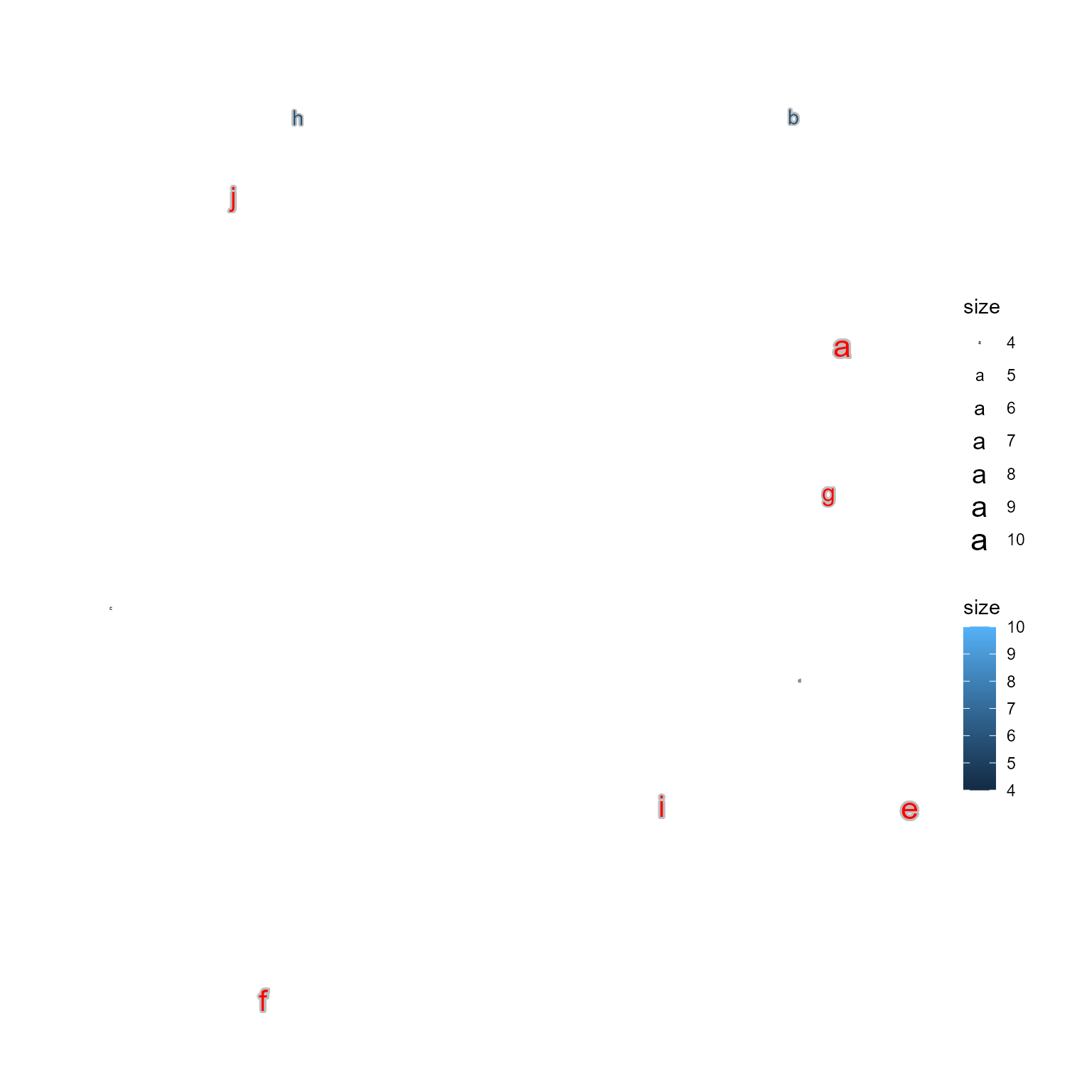
highlight_node_label
ggraph(g, layout="nicely")+
geom_node_label(aes(label=name, color=size), repel=TRUE)+
highlight_node_label(filter=size>5,highlight_color = "red", highlight_bg_color = "yellow")+
theme_graph()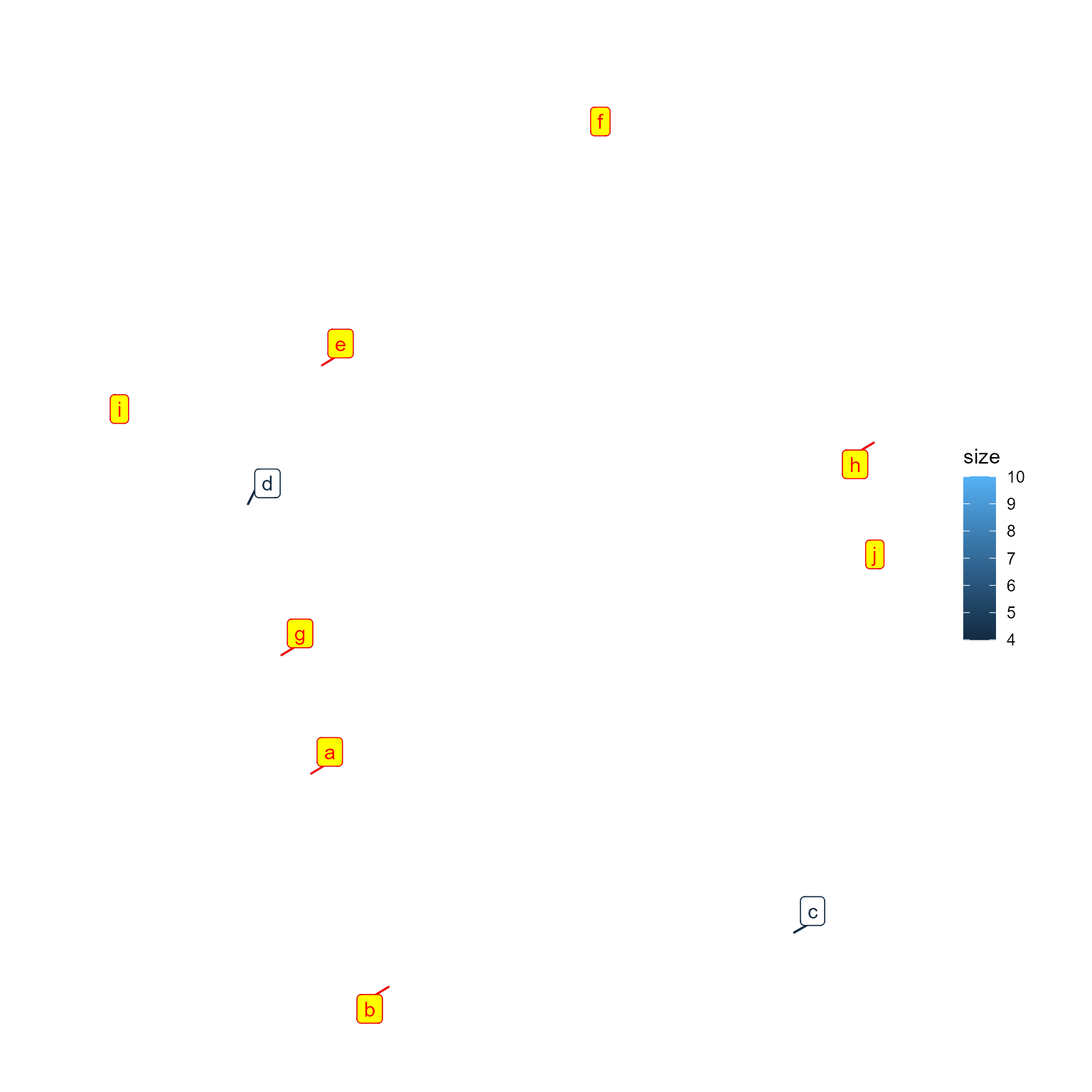
Combine
g <- random.graph.game(100,0.05,directed=FALSE)
E(g)$weight <- sample(1:10, length(E(g)), replace=TRUE)
V(g)$size <- sample(1:10, length(V(g)), replace=TRUE)
V(g)$size <- sample(1:10, length(V(g)), replace=TRUE)
ggraph(g, layout="circle") +
geom_node_point(aes(size=size, color=size))+
scale_color_viridis()+
geom_edge_diagonal(aes(color=weight))+
scale_edge_color_viridis(guide="none")+
highlight_node(filter=size>0,glow=TRUE,glow_base_size = TRUE)+
highlight_edge(filter=weight>0,glow=TRUE,glow_base_size = TRUE)+
theme_graph()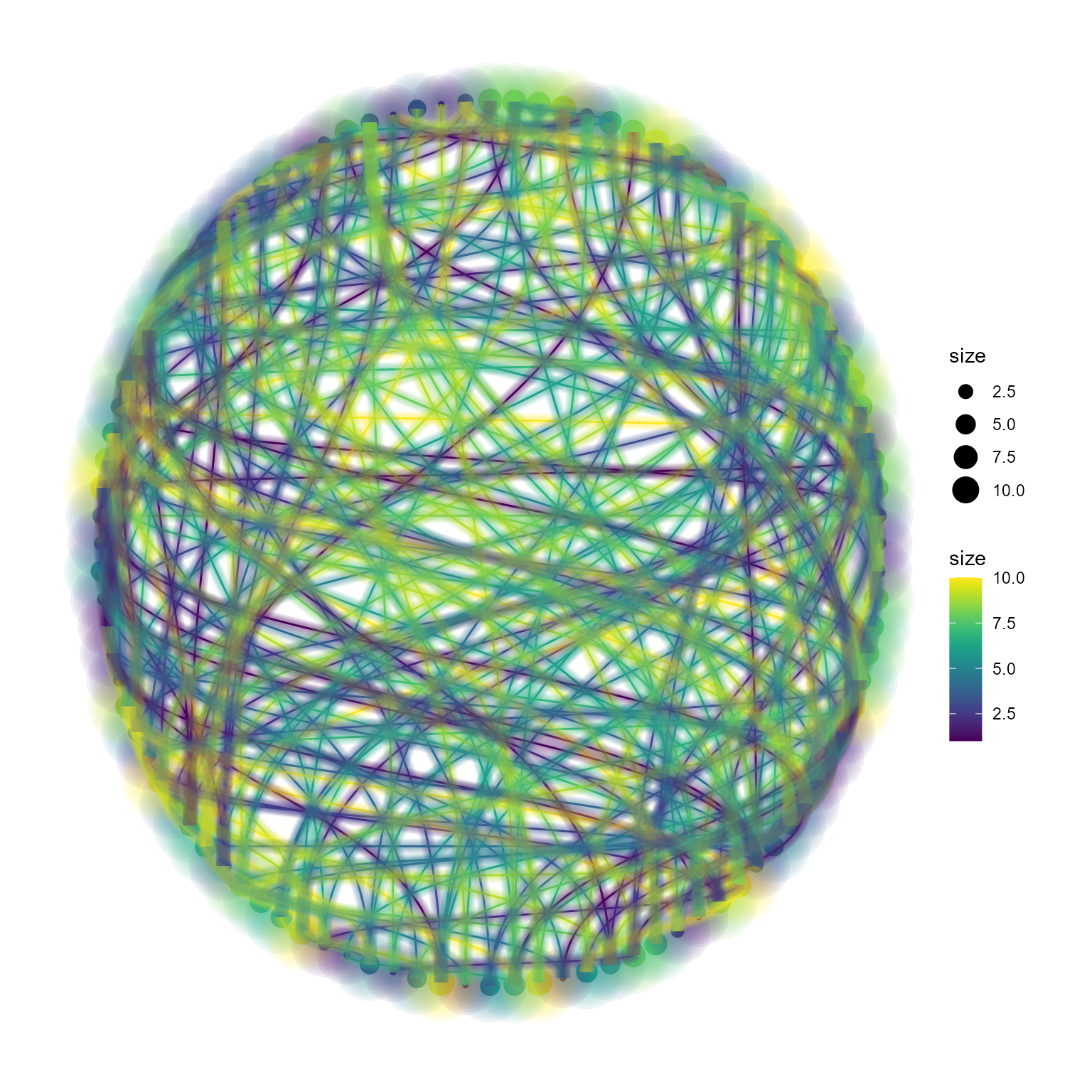
set.seed(42)
g <- sample_forestfire(nodes = 200, fw.prob = 0.01)
E(g)$weight <- sample(seq(0.1, 100, 0.1),
length(E(g)), replace=TRUE)
V(g)$size <- sample(seq(0.1, 100, 0.1),
length(V(g)), replace=TRUE)
V(g)$name <- unlist(strsplit(gsub(" ","",
stringi::stri_rand_lipsum(1)), ""))[1:length(V(g))]
ggraph(g, layout="kk") +
geom_edge_diagonal(aes(color=weight, width=weight))+
scale_edge_width(range=c(0.1,1))+
scale_edge_color_viridis(option="C", guide="none")+
highlight_edge(filter=weight>50, highlight_color = NULL,
use_ggfx="with_outer_glow",
ggfx_params = list(colour="red",expand=1))+
geom_node_point(aes(color=size, size=size))+
highlight_node(filter=size<50, use_ggfx="with_outer_glow",
ggfx_params = list(colour="white",expand=2.5))+
## Above code is same as stacking the layer:
## with_outer_glow(geom_node_point(aes(filter=size<50)),
## colour="white", expand=2.5)+
highlight_node(filter=size>70, with_text="Lorem ipsum dolor sit amet",
textpath_params=list(color = "white",
text_only=TRUE,
size=2))+
highlight_node(filter=size>50, glow=TRUE, glow_base_size = TRUE)+
scale_color_viridis(option="B")+
coord_fixed()+
theme_graph()+
theme(panel.background = element_rect(fill = 'black'))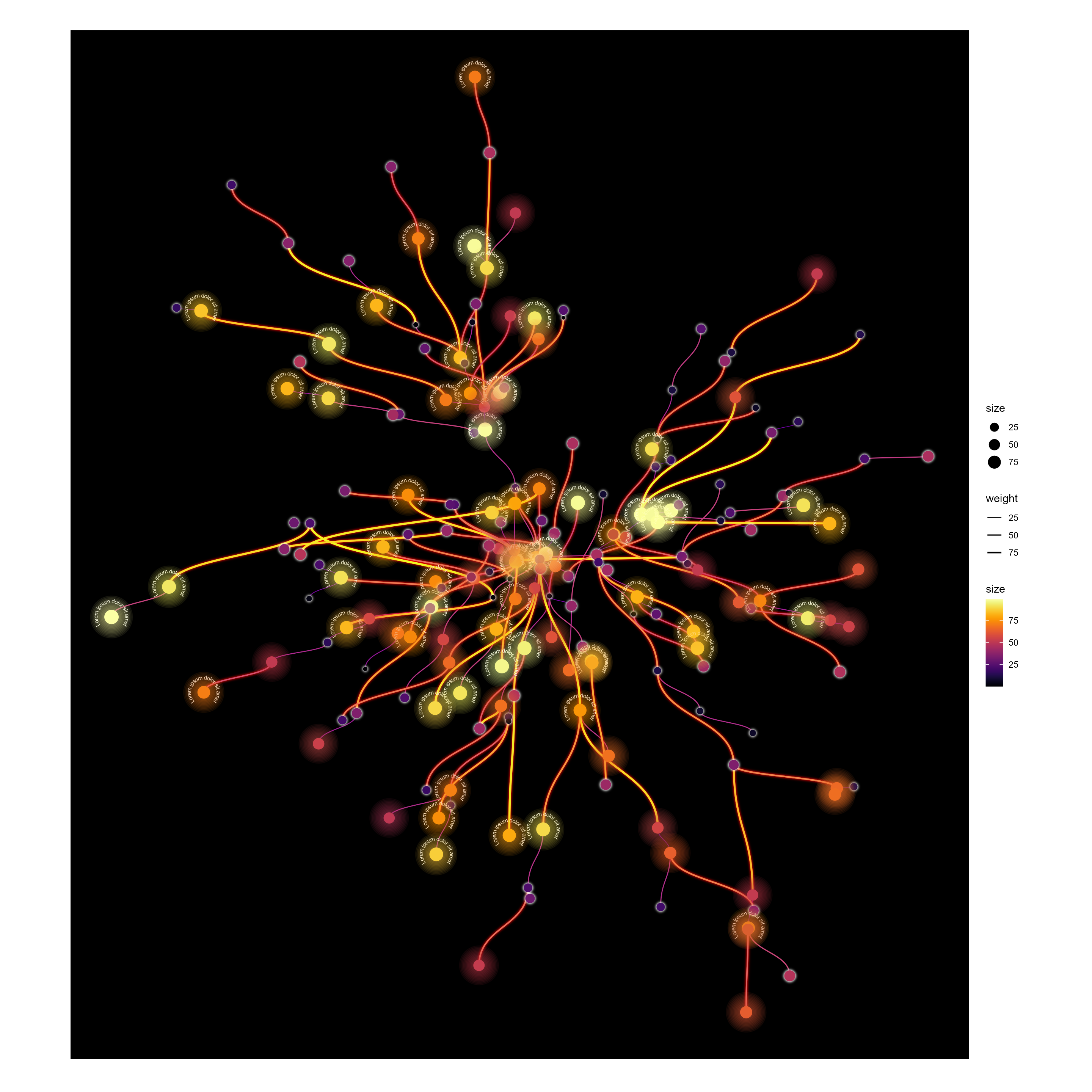
## R version 4.2.1 (2022-06-23 ucrt)
## Platform: x86_64-w64-mingw32/x64 (64-bit)
## Running under: Windows 10 x64 (build 22621)
##
## Matrix products: default
##
## locale:
## [1] LC_COLLATE=Japanese_Japan.utf8 LC_CTYPE=Japanese_Japan.utf8
## [3] LC_MONETARY=Japanese_Japan.utf8 LC_NUMERIC=C
## [5] LC_TIME=Japanese_Japan.utf8
##
## attached base packages:
## [1] stats graphics grDevices utils datasets methods base
##
## other attached packages:
## [1] geomtextpath_0.1.1 ggfx_1.0.1 graphhighlight_0.1.0
## [4] igraph_1.4.1 ggraph_2.1.0 ggplot2_3.4.1
##
## loaded via a namespace (and not attached):
## [1] ggrepel_0.9.3 Rcpp_1.0.9 tidyr_1.3.0 rprojroot_2.0.3
## [5] digest_0.6.29 utf8_1.2.3 ggforce_0.4.1 R6_2.5.1
## [9] evaluate_0.20 highr_0.10 pillar_1.9.0 rlang_1.1.0
## [13] rstudioapi_0.14 jquerylib_0.1.4 magick_2.7.4 rmarkdown_2.21
## [17] pkgdown_2.0.7 textshaping_0.3.6 desc_1.4.2 labeling_0.4.2
## [21] stringr_1.5.0 polyclip_1.10-4 munsell_0.5.0 compiler_4.2.1
## [25] xfun_0.38 pkgconfig_2.0.3 systemfonts_1.0.4 htmltools_0.5.5
## [29] tidyselect_1.2.0 tibble_3.2.1 gridExtra_2.3 graphlayouts_0.8.4
## [33] fansi_1.0.4 viridisLite_0.4.1 dplyr_1.1.1 withr_2.5.0
## [37] MASS_7.3-57 grid_4.2.1 jsonlite_1.8.0 gtable_0.3.3
## [41] lifecycle_1.0.3 magrittr_2.0.3 scales_1.2.1 cli_3.5.0
## [45] stringi_1.7.8 cachem_1.0.6 farver_2.1.1 viridis_0.6.2
## [49] fs_1.5.2 bslib_0.4.2 ragg_1.2.5 generics_0.1.3
## [53] vctrs_0.6.1 tools_4.2.1 glue_1.6.2 tweenr_2.0.2
## [57] purrr_1.0.1 shadowtext_0.1.2 fastmap_1.1.0 yaml_2.3.5
## [61] colorspace_2.1-0 tidygraph_1.2.3 memoise_2.0.1 knitr_1.42
## [65] sass_0.4.5